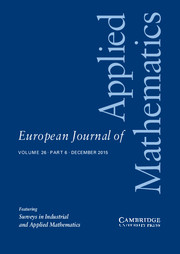Crossref Citations
This article has been cited by the following publications. This list is generated based on data provided by Crossref.
Deng, Shengfu
2014.
Existence of travelling wave front solutions of a two-dimensional anisotropic model.
Applied Mathematics and Computation,
Vol. 226,
Issue. ,
p.
503.
Lloyd, David J. B.
and
Scheel, Arnd
2017.
Continuation and Bifurcation of Grain Boundaries in the Swift--Hohenberg Equation.
SIAM Journal on Applied Dynamical Systems,
Vol. 16,
Issue. 1,
p.
252.
Ercolani, Nicholas M.
Kamburov, Nikola
and
Lega, Joceline
2018.
The phase structure of grain boundaries.
Philosophical Transactions of the Royal Society A: Mathematical, Physical and Engineering Sciences,
Vol. 376,
Issue. 2117,
p.
20170193.
Scheel, Arnd
and
Weinburd, Jasper
2018.
Wavenumber selection via spatial parameter jump.
Philosophical Transactions of the Royal Society A: Mathematical, Physical and Engineering Sciences,
Vol. 376,
Issue. 2117,
p.
20170191.
Monteiro, Rafael
and
Yoshinaga, Natsuhiko
2020.
The Swift–Hohenberg Equation under Directional-Quenching: Finding Heteroclinic Connections Using Spatial and Spectral Decompositions.
Archive for Rational Mechanics and Analysis,
Vol. 235,
Issue. 1,
p.
405.
Haragus, Mariana
and
Iooss, Gérard
2021.
Bifurcation of Symmetric Domain Walls for the Bénard–Rayleigh Convection Problem.
Archive for Rational Mechanics and Analysis,
Vol. 239,
Issue. 2,
p.
733.
Haragus, Mariana
and
Iooss, Gérard
2022.
Domain Walls for the Bénard–Rayleigh Convection Problem with “Rigid–Free” Boundary Conditions.
Journal of Dynamics and Differential Equations,
Vol. 34,
Issue. 4,
p.
3217.
Malomed, Boris A.
2022.
New findings for the old problem: Exact solutions for domain walls in coupled real Ginzburg-Landau equations.
Physics Letters A,
Vol. 422,
Issue. ,
p.
127802.
Brown, Christopher
Derks, Gianne
van Heijster, Peter
and
Lloyd, David J B
2023.
Analysing transitions from a Turing instability to large periodic patterns in a reaction-diffusion system.
Nonlinearity,
Vol. 36,
Issue. 12,
p.
6839.
Iooss, Gérard
2024.
Heteroclinic for a 6-Dimensional Reversible System Occurring in Orthogonal Domain Walls in Convection.
Journal of Dynamics and Differential Equations,


